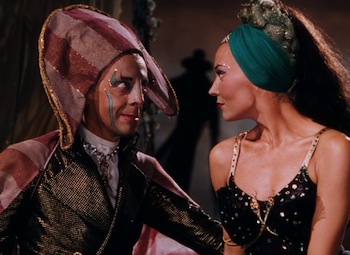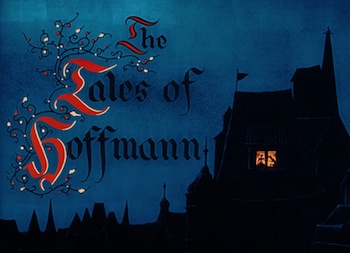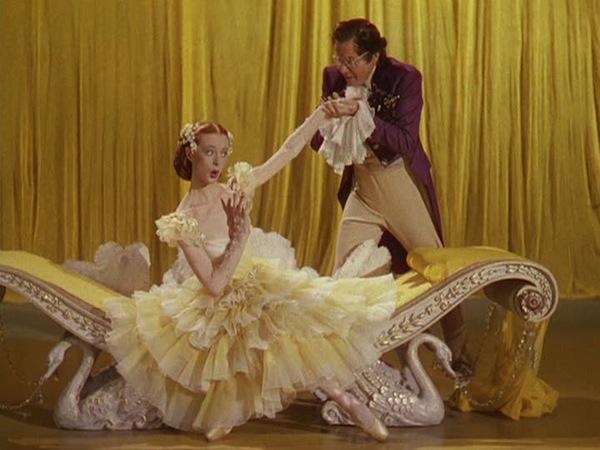Michael Powell and Emeric Pressburger’s film of Jacques Offenbach’s 1881 opera The Tales of Hoffmann was the Archers duo’s crazily ambitious attempt to create a synaesthetic magical realm abstracted from realism through an immersion in “total art” – music, dance, colour, design – in the austerity Britain of 1951. They triumphed with the magic, though only the individual viewer can say if he or she can “hear” Moira Shearer’s dragonfly dance or “see” soprano Ann Ayars’s aria.
The Archers slightly altered and rearranged Jules Barbier’s libretto. Between acts in a Nuremberg performance by the prima ballerina Stella (Shearer), the poet Hoffmann (Robert Rounseville) goes to a tavern; Stella’s note to him requesting an assignation is intercepted by Councillor Lindorf (Robert Helpmann, who rematerializes as Hoffmann’s Mephistopheleian nemesis in the three ensuing tales). Hoffmann regales his fellow drinkers with stories of his tragic love affairs: with the automaton Olympia (Shearer), built by the scientist Spalanzani (Léonide Massine), with the Venetian courtesan Giulietta (Ludmilla Tchérina, pictured below with Helpmann), and with the consumptive opera singer Antonia (Ayars) on a Greek island. Hoffmann ends as he began: the artist as self-destructive genius and outcast – like Lermontov in the Archers' The Red Shoes (1948), like Powell himself after the vilification of Peeping Tom (1959).
 Hoffmann was suggested to Powell and Pressburger by Sir Thomas Beecham, who would pre-record the score and appear as himself in a witty concluding cameo. The absence of spoken dialogue facilitated Powell’s wish to create a “composed film”, in which the images would illustrate the musical track rather than the music supporting the images: he had experimented with this in the terrifying Expressionistic sequence that climaxes Black Narcissus (1947), as well as The Red Shoes. The kind of romantic agony, morbid eroticism, and Freudian themes germane to the Hoffmann stories had been echoed in the Archers’ 1940s masterworks. The three idealised and unobtainable women Hoffmann yearns for were anticipated by the three Deborah Kerr characters who manifest Clive Candy’s elusive feminine ideal in 1943’s The Life and Death of Colonel Blimp.
Hoffmann was suggested to Powell and Pressburger by Sir Thomas Beecham, who would pre-record the score and appear as himself in a witty concluding cameo. The absence of spoken dialogue facilitated Powell’s wish to create a “composed film”, in which the images would illustrate the musical track rather than the music supporting the images: he had experimented with this in the terrifying Expressionistic sequence that climaxes Black Narcissus (1947), as well as The Red Shoes. The kind of romantic agony, morbid eroticism, and Freudian themes germane to the Hoffmann stories had been echoed in the Archers’ 1940s masterworks. The three idealised and unobtainable women Hoffmann yearns for were anticipated by the three Deborah Kerr characters who manifest Clive Candy’s elusive feminine ideal in 1943’s The Life and Death of Colonel Blimp.
As opulent as it is self-consciously campy, as sensual as it is emotionally underwhelming, Hoffmann is possibly the greatest opera film in an uncluttered field. That suggests it’s a lesser work than The Red Shoes, indisputably cinema’s ultimate contribution to balletomania. However, opera lovers, modern aesthetes, and Archers completists will want to own StudioCanal’s new Hoffmann DVD or Blu-ray alongside Criterion’s 2005 Region 1 edition (which comes with Powell’s 1955 short The Sorcerer’s Apprentice).

The stunning new Hoffmann 4K restoration reincorporates footage that the Archers had been forced to cut: a crucial sequence that develops the plight of Antonia, and a playful epilogue that presents the hitherto unseen opera singers alongside the dancers and actors they voiced (Rounseville and Ayars were the only performers who sang their parts). Supplements include an interview with Archers champion Martin Scorsese and another with Thelma Schoonmaker, Powell’s widow and the distinguished editor of Scorsese’s films.















Add comment